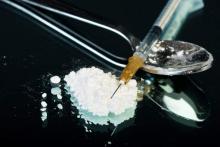WASHINGTON – The Obama administration announced Aug. 17 that it will spend an additional $13.4 million fighting opioid and heroin abuse, emphasizing treatment over law enforcement.
The increased emphasis will center on geographic areas where heroin and opioid abuse are rampant, specifically Appalachia; New England; Philadelphia/Camden, N.J.; metropolitan New York City, particularly northern New Jersey; and the Washington/Baltimore metro region. Public safety officers and first responders will be trained in how to administer naloxone and provide other medical attention for those in the midst of a heroin or opioid overdose.
The 15 states in the targeted areas will share and leverage data to determine regional patterns of heroin and prescription painkiller-related overdose. These data are expected to delineate where the narcotics – especially those laced with other, more dangerous drugs – are being produced and distributed so that heroin response teams can disrupt the production and distribution of illegal drugs, but respond pre-emptively by expanding resources to communities hardest hit.
In a statement, Michael Botticelli, director of the White House Office of National Drug Control Policy, said the administration’s emphasis on “the national drug challenge as both a public health and public safety issue” is based on viewing drug addiction as “a chronic disease of the brain that can be successfully prevented and treated, and from which one can recover.”
The initiative also will provide additional funding for similar efforts to address opioid abuse and methamphetamine abuse in the Southwest and along the United States/Mexico border.
“This program demonstrates the importance of linking health to criminal justice in collaboration rather than seeing better, new drug policy as a choice between health and law enforcement,” Dr. Robert L. DuPont, former director of the National Institute on Drug Abuse (NIDA), and president of the Institute for Behavior and Health, said in an interview.
On Twitter @whitneymcknight

